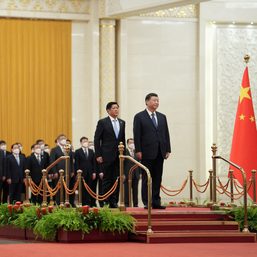SUMMARY
This is AI generated summarization, which may have errors. For context, always refer to the full article.
![[ANALYSIS] Reasserting sea control over Reed Bank: Averting a power crisis](https://www.rappler.com/tachyon/2023/05/tl-reed-bank.jpg)
The Malampaya gas field will be depleted by the first quarter of 2027. Efforts to find an alternative source of energy is stymied, because we allowed ourselves to be a willing hostage to a joint development deal with the Communist Party of China (CCP). This was an offshoot of the MOU on Cooperation on Oil and Gas Development signed in 2018, but it was eventually terminated in June 2022 due to Beijing’s intransigence in not recognizing the country’s sovereign rights over the Reed Bank.
Former Foreign Affairs Secretary Teodoro Locsin Jr. best described the country’s dilemma with the deal: “[it] got as far as it is constitutionally possible to go.” Relatedly, the Supreme Court has recently declared a 2005 agreement with China and Vietnam as unconstitutional, for allowing foreign corporations to prospect for natural resources belonging to the Filipino people without proper safeguards.
These prior events casts a shadow over President Marcos’ attempt to reboot the negotiations on joint development with Xi Jinping. Perhaps Marcos sees it as a positive way of re-engaging China at the economic front, if only to mitigate the impact of renewed PH-US security relations. However, this undertaking is not without its pitfalls, basing on last September’s initial discussions by Foreign Affairs Secretary Enrique A. Manalo with China’s Foreign Minister Wang Yi and the CCP’s International Department Minister Liu Jianchao. Manalo said that the CCP was after a 50-50% or 51-49% division of share, and demanded that the deal be covered under China’s domestic laws. Senator Tolentino did warn that any new agreement between the Philippines and China should comply with the provisions enshrined under the country’s charter, noting that exploitation of natural resources are exclusively given only to Filipinos.
While we negotiate in good faith, China has deployed its maritime forces to compel our government to accede to their demands. In an incident last April 4, 2022, the DOE was forced to discontinue all exploration activities for SC 75 and SC 72 after a Chinese Coast Guard vessel shadowed the Geo Coral and the Mariska G; these were two vessels contracted by PXP Energy Corp to conduct seismic survey near Reed Bank, just around 60 miles off the western coast of Palawan. Multinational companies hesitate to invest their time and resources into supporting our energy needs for fear of bearing the brunt of China’s coercive tactics in the service contract areas. There is also the possibility that the CCP is quietly dissuading these companies from participating in joint venture negotiations with the Philippines.
For the past six years, the government allowed the CCP leverage over our energy security needs in two ways: (1) by sticking to a negotiation track that is bound to fail given the constitutional issues involved; and, (2) by failing to protect the exploration activities at the service contract areas in Reed Bank from harassment of the Chinese Coast Guard. This shakedown is meant to force us to acquiesce under their terms; and with three years left, time is on their side. Perhaps they calculate that by 2026, we will be desperate enough to agree to their terms just to avert a power crisis. Or perhaps, at the last minute they might just agree to our terms but with a caveat, by convincing us to allow the PLA-N and CCG vessels to patrol the exploration site under the pretext of securing a major investment. It will legitimize their presence inside our EEZ, and we might just be gullible enough to claim it as a big win for us.
Our government needs to unshackle its maritime forces, the Navy and Coast Guard, by rescinding policies and directives that have prevented them from protecting Filipino lives, properties, and activities at sea. This is akin to restoring peace and order in a crime-ridden barangay after six years of neglect.
From a naval standpoint, our energy security is premised on our ability assert sea control over the WPS in general, and among the service contract areas in particular. This means concentrating the fleet in the Reed Bank and adjacent waters. Through sustained presence, confidence among multinational companies hopefully improves and inspires interest in exploring the Reed Bank for alternative energy sources. If a joint patrol with the US Navy and other partner-navies in the WPS materializes, it would create a more robust deterrent effect countervailing China’s coercive tactics in the service contract areas.
Our lack of secure access to Reed Bank is not just about the right to exercise our sovereign rights in our own EEZ. More importantly, it is about the country’s energy security, which migrates to existential issues involving our way of life: employment, living standards, food security, etc. According to prior surveys, more than 80% of Filipinos wants the government to assert our rights over the WPS. We should listen to them. Time is not our friend. – Rappler.com
Rear Admiral Rommel Jude Ong (Ret.) is currently Professor of Praxis at the Ateneo School of Government. He was formerly the Vice Commander of the Philippine Navy.
Add a comment
How does this make you feel?



![[ANALYSIS] The Reed Bank gaffe and misunderstanding Malampaya](https://www.rappler.com/tachyon/2023/05/The-Reed-Bank-Gaffe-and-Misunderstanding-Malampaya.jpg?resize=257%2C257&crop=271px%2C0px%2C720px%2C720px)
![[OPINION] Malampaya plus 15: A tale of the lesser evil](https://www.rappler.com/tachyon/2023/05/imho-malampaya-lesserevil.jpg?resize=257%2C257&crop=286px%2C0px%2C720px%2C720px)





There are no comments yet. Add your comment to start the conversation.